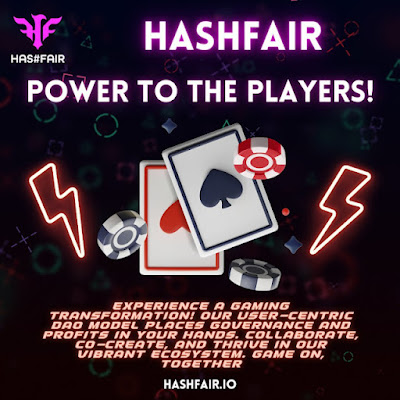HASHFAIR GAMES creates an environment where players can trust the outcomes and have a more immersive and rewarding gaming experience.
The online gaming industry has witnessed remarkable advancements in recent years, with the emergence of Web3 technology paving the way for decentralized gaming platforms. One of the most exciting developments in this realm is the concept of HASHFAIR GAMES, which leverages blockchain technology to enhance fairness and randomness in online gaming. In this blog post, we will explore the key differences between Web2 and Web3 online games, focusing on how HASHFAIR GAMES brings a new level of transparency and trust to the gaming experience.
Web2: The Current State of Online Games
Web2 online games, which dominate the current gaming landscape, are built on centralized platforms where game developers retain complete control over the game environment. In such games, fairness and randomness are often a cause for concern. Players are left to trust that the developers have implemented fair algorithms and that the game outcomes are truly random. However, without verifiable proof, doubts can arise regarding the integrity of the gaming experience.

Web3: The Rise of Decentralized Gaming
Web3 technology, powered by blockchain and smart contracts, offers a revolutionary solution to the challenges faced by Web2 games. By leveraging the transparency and immutability of blockchain, Web3 gaming platforms bring a new level of fairness and randomness to the gaming ecosystem. This is where HASHFAIR GAMES comes into play.
HASHFAIR GAMES: A New Era of Fairness and Randomness
HASHFAIR GAMES utilizes blockchain technology to ensure that every aspect of the gaming process is transparent and fair. Here’s how it works:

1. Provably Fair Gameplay:
HASHFAIR GAMES uses cryptographic hashes to ensure that game outcomes are tamper-proof and verifiable. Players can independently verify the fairness of a game by checking the hash provided before and after the game session. This eliminates any doubts about rigged outcomes and engenders trust among players.
2. Decentralized RNG (Random Number Generation):
Randomness is a crucial element in gaming, and HASHFAIR GAMES employs decentralized RNG powered by blockchain. Unlike traditional Web2 games that rely on centralized random number generators, which can be manipulated, HASHFAIR GAMES uses algorithms built on the blockchain, making them transparent and immune to manipulation.

3. Tokenized Economy:
Another advantage of Web3 gaming platforms like HASHFAIR GAMES is the integration of tokenized economies. By utilizing cryptocurrencies or utility tokens, players have true ownership of their in-game assets, which can be traded or sold on decentralized marketplaces. This enables a player-driven economy, fostering a more engaging and rewarding gaming experience.
4. Community Governance:
Web3 gaming platforms often adopt decentralized governance models, where players have a say in the decision-making process. HASHFAIR GAMES allows the community to participate in platform development, future game releases, and even the resolution of disputes. This empowers players and ensures that the platform evolves in a manner aligned with their preferences.

Web3 technology has opened up new possibilities for online gaming, and HASHFAIR GAMES represents the evolution of fairness and randomness in the gaming industry. By leveraging blockchain technology, provably fair gameplay, decentralized RNG, tokenized economies, and community governance, HASHFAIR GAMES creates an environment where players can trust the outcomes and have a more immersive and rewarding gaming experience. As the Web3 revolution continues to unfold, we can expect even greater advancements in the gaming industry, ultimately benefiting players worldwide.
#HashFairGames #HashFair #HFG #blockchain #cryptocurrency #technology #bitcoin #money #crypto #Binance #BNB #cryptocurrencies #fintech @Hashfair_Games
Author

Komentar
Posting Komentar